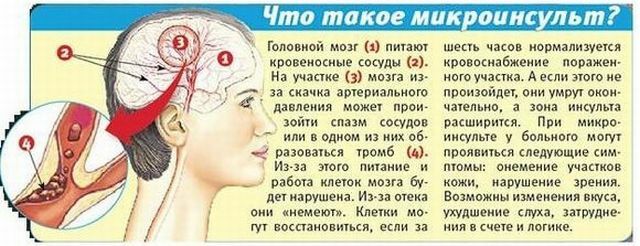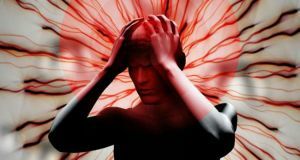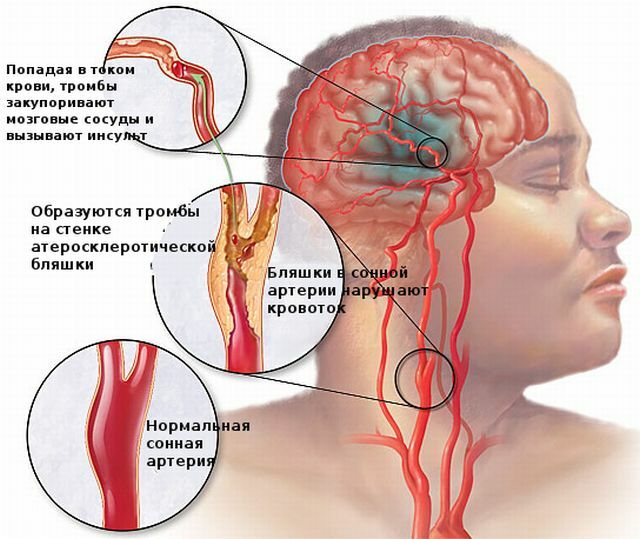Stroke (acute impairment of cerebral blood supply) - neurological disease characterized by loss of brain cells as a result of hemorrhage or cerebral artery occlusion. This disease can cause atherosclerosis, vascular occlusion of blood clots, thrombosis, heart disease (heart attack), aneurysm and hypertension.

Secondary prevention of stroke is called a set of measures aimed at preventing disease recurrence. It includes:
- the elimination of risk factors (normalization of food, smoking cessation, the fight against alcohol addiction, prevention of stress, pressure normalization, treatment of thrombosis);
- medication prescribed by a doctor after the first attack of acute cerebral ischemia;
- Treatment somatic disorders (endocrine diseases, heart disease);
- rehabilitation (Rest in sanatorium, physiotherapy, gymnastics);
- control of blood pressure and laboratory parameters;
- regular monitoring by a doctor.
Food
Crucial for primary and secondary prevention of stroke has proper nutrition. Diet is especially important in lesions of cerebral vascular atherosclerotic plaques. This disease is the result of disturbances of lipid metabolism, when blood increased atherogenic lipoproteins (VLDL and LDL), which leads to occlusion of blood vessels and ischemic stroke.

The diet should be aimed at reducing the level of total cholesterol and atherogenic lipoproteins (atherosclerosis), reduction of pressure (in the case of hypertension) and providing the body proteins, fats, carbohydrates, fiber, minerals and compounds vitamins. At a hemorrhagic stroke on the menu include further products which reinforce the vessel walls. Thrombosis is recommended to include in the diet products, blood thinners (citrus fruits, tomatoes, onion, garlic, eggplant, red bell pepper, cranberry, plum, seafood, greens).
the general principles power stroke They are:
- Decrease salt intake. This product enhances pressure and the formation of plaques on the arterial endothelium. In order to prevent recurrence need to abandon the use of pickles, pickles, crackers, salted sunflower seeds, salted fish and chips. You can not dosalivat food after cooking.
- Refusal of strong coffee, black tea, carbonated and alcoholic beverages. After a stroke is useful to drink clean water, herbal tea, broth hips, fresh juices and fruit drinks.
- Limiting the amount of sugar consumed. To this end, it is recommended to give up sweets and sugary drinks. This is especially important for people who are obese. Overweight negatively affects the brain's blood vessels.
- Enrichment of the diet with fresh fruits, vegetables, herbs, nuts, dried fruits, sources of polyunsaturated fatty acids (fish) and berries.
- Restricting caloric intake.
- Adherence to a strict regime of eating. There are recommended 5-6 times a day gradually. A tendency to stroke can not eat before going to bed. The food should be distributed within a day of caloric. Breakfast should be 25-30% of daily calories, lunch - 30-35%, dinner - 15-20%. Dining need not later than 8 pm. Are optimal intervals between meals 3-3.5 hours.
- Proper heat treatment of food. It is necessary to give up frying. Possible stewing, baking and cooking.
- Waiver of fatty foods and baking. To prevent recurrent stroke should give up fatty meat (chicken skin, duck, lamb, beef) oily fish, cream, purchased sauces, mayonnaise, hamburger, grilled dishes, sweet pastries, Offal, jellies and sausage. Patients can eat cereals, lean soups, low-fat dairy products, fish, vegetarian food and lean meat (chicken, veal, turkey, rabbit).

Work
To prevent recurrent stroke, you need to change your lifestyle. It is necessary to change the type of activity. If earlier people working in stressful or difficult working conditions, it is necessary to transfer to another job. It is important to eliminate stress (which can cause vasospasm and recurrent stroke) and reduce physical stress. Also not recommended for activities which require a constant slope.
pressure control
To prevent recurrent stroke, it is necessary to control blood pressure. Normally, it should not exceed 139/89 mm Hg The optimum value of blood pressure - 120/80 mm Hg After suffering a stroke earlier recommended pressure measured twice a day. To do this, you need to buy a tonometer. Hypertension should immediately consult a doctor. With the aim of normalizing the blood pressure should be taken antihypertensive agents (ACE inhibitors, calcium channel blockers or diuretics).

medicines
Prophylaxis of recurrent stroke involves application of medication. Can be assigned:
- Means thinning the blood and preventing the formation of blood clots (anticoagulant and antiplatelet). They are shown in stroke caused by thrombosis. Administer medication as Heparin, Warfarin, Aspirin Cardio, Clopidogrel and Dipyridamole.
- Statins and fibrates. They are irreplaceable at an elevated cholesterol level, family dyslipidemia and high blood triglycerides. Rosuvastatin can be administered, Rozukard, Tevastor, Roxer, Crestor, Lovastatin, Cardiostatin, simvastatin, Zocor, Vasilip, Simvor, Livazo, Atorvastatin, Lipitor and Atoris.
- Antihypertensive agents.
- Nootropics. These include: Phenibut, Noopept, Cortexin, Pikamilon, Piracetam, Pikogam, Pikanoil, Nootropil and Memotropil. These drugs improve speech, thought and attention, and normalize the blood circulation in the brain, protect nerve cells from toxic substances, have an antioxidant effect (increase resistance to lack of brain cells oxygen).
- Antioxidants (Mildronate, Meksidol).
- Vascular means (Glycine, Pentoxifylline, Cavinton, Vinpocetine). Glycine affects the metabolism of the brain, as well as reduces the severity of neurologic deficits after stroke. Medications must be taken under the tongue and dissolve.
Certain medicines for prevention of stroke may be assigned a short course, while others are used for life (antihypertensives and statins). Medications selects the physician taking into account the contraindications, the type of stroke and individual tolerance.



